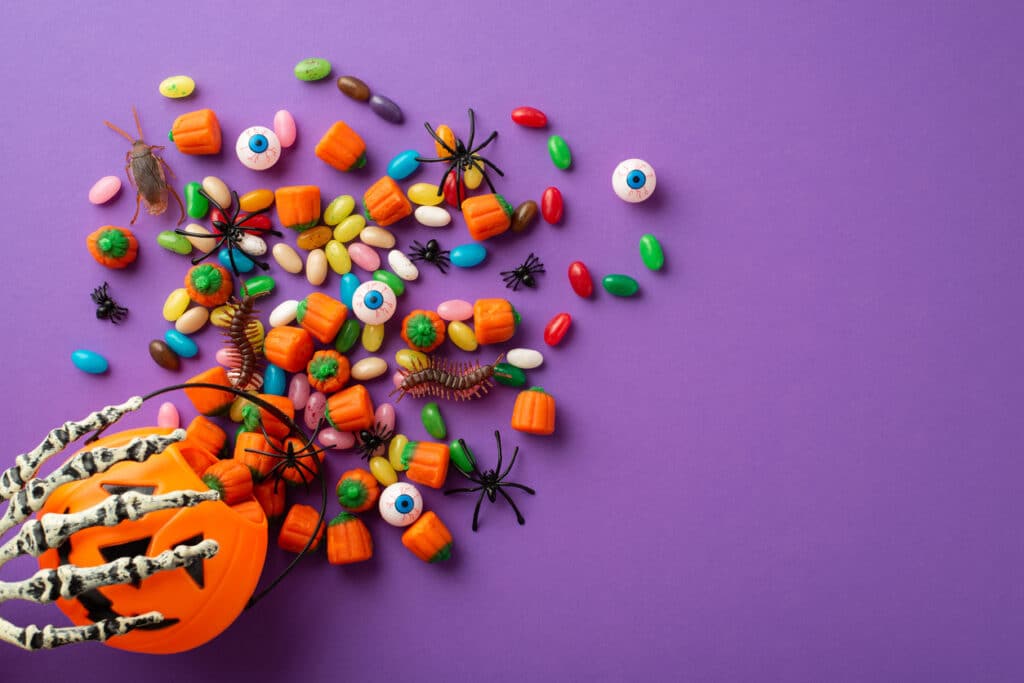The Unstoppable “Reset” Mindset
Reset is for anyone who knows the strain of balancing life on the tightrope of being everything to everyone.


Halloween is a holiday full of excitement, costumes, and of course, candy. For many parents, the abundance of sugary treats can bring concerns about their children’s health and eating habits. Yet, this season offers an incredible opportunity to help children develop a healthy relationship with food. By modelling mindful eating and trusting the body’s natural cues, parents can teach children that enjoying candy in moderation is not something to fear. With the right mindset, Halloween candy becomes part of a balanced and healthy lifestyle.
Embrace Mindfulness, Not Restriction
It’s common for parents to set strict limits on candy consumption, thinking that it will help children avoid unhealthy eating patterns. However, overly restricting certain foods—like Halloween candy—can create a sense of deprivation. When children feel they’re not allowed to have something, it can become even more desirable, leading to overeating when they finally get their hands on it.
Instead of imposing rigid rules, parents can encourage mindful eating. Mindful eating involves slowing down, savoring each bite, and paying attention to the body’s signals. When children learn to enjoy their Halloween candy mindfully, they become more in tune with their hunger and fullness cues. This helps them feel satisfied with smaller amounts and reduces the urge to overindulge. Modeling this behavior as a parent is key; when children see their parents eating mindfully, they’re more likely to adopt the same habits.
By embracing mindfulness, children learn that candy is not something to be feared or consumed in excess. It’s just another type of food that can be enjoyed in moderation. This mindset shift helps them develop a more balanced and positive relationship with food from an early age.

Trust the Body’s Natural Cues
A fundamental part of fostering a healthy relationship with food is teaching children to trust their body’s natural signals. Hunger and fullness cues are built-in mechanisms that guide when and how much to eat. However, these cues can be easily overridden by external pressures, such as societal expectations or strict food rules. Helping children tune into their internal cues is essential for developing long-term healthy eating habits.
Parents can model this by eating in a way that honors their own hunger and fullness signals. For example, instead of finishing a candy bar just because it’s there, demonstrate stopping when you feel satisfied. Talk to children about how it’s okay to have a few pieces of candy and stop when they no longer feel hungry or when they’ve had enough.
When children learn to trust their own bodies, they’re less likely to feel out of control around candy or other “forbidden” foods. They’ll understand that it’s okay to enjoy Halloween candy and that they don’t need to overeat to feel satisfied. This approach empowers children to make choices based on how they feel, rather than following arbitrary rules or pressures from others.
Teaching Balance and Moderation
Halloween presents the perfect opportunity to instill lessons of balance and moderation in children’s eating habits. Rather than demonizing candy as “bad” food, parents can show children how it fits into an overall balanced diet. Explain that candy is just one type of food, and while it’s okay to enjoy it, it’s important to listen to the body and eat a variety of other foods that provide nourishment.
Parents can involve children in conversations about balance by discussing how their bodies need different types of nutrients to feel strong and healthy. Framing candy as something that can be enjoyed occasionally, without guilt, helps children view food in a positive light. It also prevents them from developing unhealthy food fears or disordered eating patterns later in life.
Additionally, parents can demonstrate how to manage candy consumption in a way that feels good. For example, instead of eating all the candy at once, help children create a plan to enjoy it over several days. This teaches moderation and allows children to enjoy their Halloween treats while still honoring their hunger and fullness cues.

Modeling a Positive Relationship with Food
Children are constantly observing how their parents interact with food, and this shapes their own attitudes and behaviors. When parents exhibit a healthy, balanced relationship with food, it sets a powerful example for their children to follow. This Halloween, parents can model mindful eating by enjoying candy without guilt or stress. Show children that it’s okay to have a piece or two, and then listen to the body’s cues about when to stop.
It’s important to avoid labeling candy or other treats as “bad” foods. Instead, focus on the idea that all foods can be part of a healthy lifestyle when consumed mindfully. Parents can also talk about how they feel after eating candy—perhaps noting how it’s enjoyable but doesn’t make them feel as energized as fruits or vegetables. This encourages children to think about how food affects their bodies and helps them make informed choices.
A Healthier Approach to Halloween Candy
Halloween doesn’t have to be a time of stress or concern about candy consumption. With the right mindset, it can be a valuable teaching moment for children. By modeling mindful eating, trusting the body’s natural cues, and promoting balance, parents can help children develop a healthy and positive relationship with food.
Teaching children to enjoy Halloween candy without fear or guilt sets the stage for lifelong healthy eating habits. They’ll learn that food is something to be appreciated, not feared, and that candy, like all foods, can be enjoyed as part of a balanced and fulfilling diet. This Halloween, give children the gift of a healthier relationship with food—and show them that candy is just a small, sweet part of a bigger, balanced picture.
Bio:
Dr. Supatra Tovar (LIC #PSY31949) is one of the few clinical psychologists in the nation who is also a registered dietitian (CDR #86029010) and BASI Certified Pilates fitness expert. Dr. Tovar teaches clients how to use research-based techniques in behavioural psychology, nutritional science, and exercise kinesiology to overcome complex challenges. She harnesses the different disciplines of her unique background to show her clients how small modifications to daily habits can transform mindsets, enhance personal relationships, and accelerate professional trajectories. Dr. Tovar has helped clients navigate through trauma, eating disorders, depression, anxiety, and grief.
Driven by her deep understanding of the mind, body, and nutrition and by personal experiences that revealed their interconnections, Dr. Tovar founded ANEW, Advanced Nutrition and Emotional Wellness, to offer simple routines to improve your mindset, your health, and your spirit. The flagship online video course, “Deprogram Diet Culture,” guides participants through the successful 7-step method she has employed to help clients break free from the destructive cycles of dieting and weight gain. A condensed version of the course is available as a book Deprogram Diet Culture: Rethink Your Relationship with Food, Heal Your Mind, and Live a Diet-Free Life to be published in September of 2024. Future publications will further explore the integration of psychology, nutrition, and physical wellness.
Dr. Tovar earned her doctorate in psychology from the California School of Professional Psychology and has two master’s degrees, including a Master of Science in Nutrition. She is also a BASI Certified Pilates Instructor, reflecting over 20 years of dedication to integrating physical fitness with mental and nutritional health.
For more information go to www.anew-insight.com and www.drsupatratovar.com. LinkedIn: https://www.linkedin.com/in/drsupatratovar/
Reset is for anyone who knows the strain of balancing life on the tightrope of being everything to everyone.

Do you remember how delightful Christmas holiday was when you were little? If the countdown to Christmas is stressing you out, it just means you’ve grown up! Read these tips to reclaim the magic of the holiday season.

Growing up as a child, I always enjoyed paint by numbers and colouring books and drawing of any sort. Pencils and paper were my favourite tools and I always love to draw. As I became more interested in art, I discovered that I am partially colour blind to all hues of colour. When I discovered…
